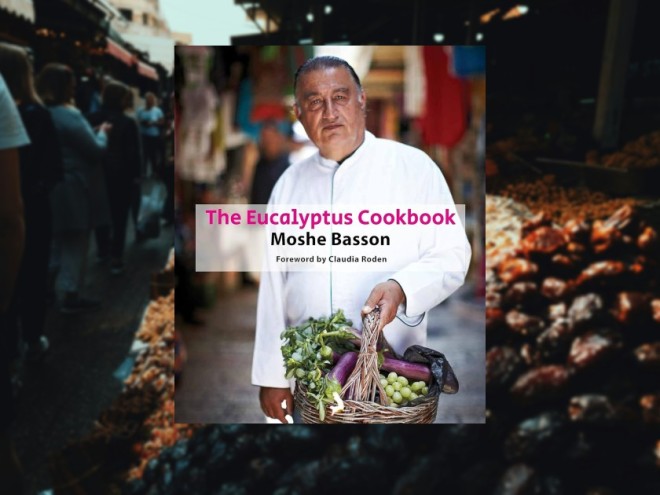In his Jerusalem restaurant, chef Moshe Basson seeks to bring “a modern Israeli interpretation to the Land of Milk and Honey with food from the Bible.” This may be a lofty aim, but it is magnificently achieved.
Basson opened his first Eucalyptus restaurant in 1986, which he named for the tree he planted one Tu B’Shevat near his family home in Jerusalem. Today, the restaurant is located outside Jerusalem’s city walls, in the artists’ colony, and reservations are essential.
Ingredients such as eggplant, pomegranate, za’atar, couscous, chickpeas, and local produce and herbs make regular appearances, as one would expect from a cookbook that skews Middle Eastern. Accompanying each recipe is a charming story with details about the dish, why it’s included, its origins, and the author’s own relationship to its ingredients. Basson writes with good humor about his family, his memories, and the creation of his recipes. Clear preparation instructions, along with mouth-watering photos, invite readers to give these dishes a try.
If slow-cooked lamb in golden crust or Aunt Aliza’s baklava sound daunting, there is plenty for the less ambitious home cook to work with. The key to Basson’s recipes: trust your instincts and your own sense of taste and smell.
Basson’s whole family loves to cook. His mother and her family, who were from Iraq, served as early influences on him. In Israel, his parents ran a bakery, so food preparation was nothing unusual for him.
Basson, whose father was religiously observant, retells biblical stories related to food. Writing about the foraging he enjoys in the Jerusalem area, he pairs a recipe for purslane leaves with a story from the Talmud about Rabbi Yehuda HaNasi.
Near his recipe for stuffed grape leaves, Basson recounts planting a vine and a fig tree, inspired by a verse in I Kings: “Judah and Israel dwelt safely, every man under his vine and under his fig-tree.” He also offers Jacob and Esau lentil stew, named for the two brothers in Genesis.
There is much to enjoy in this cookbook beyond the recipes (although they would have been enough). It is a feast for the eyes and the palate as well as a step back into history. It isn’t shy about its appreciation for the flora and fauna of the Land of Israel and for the cultures and traditions that have become part of Israeli cuisine.



